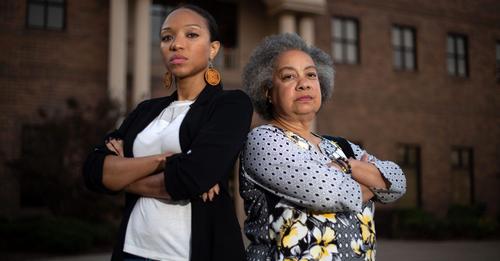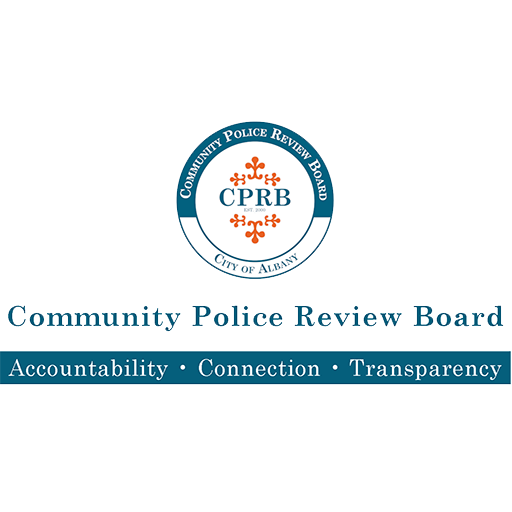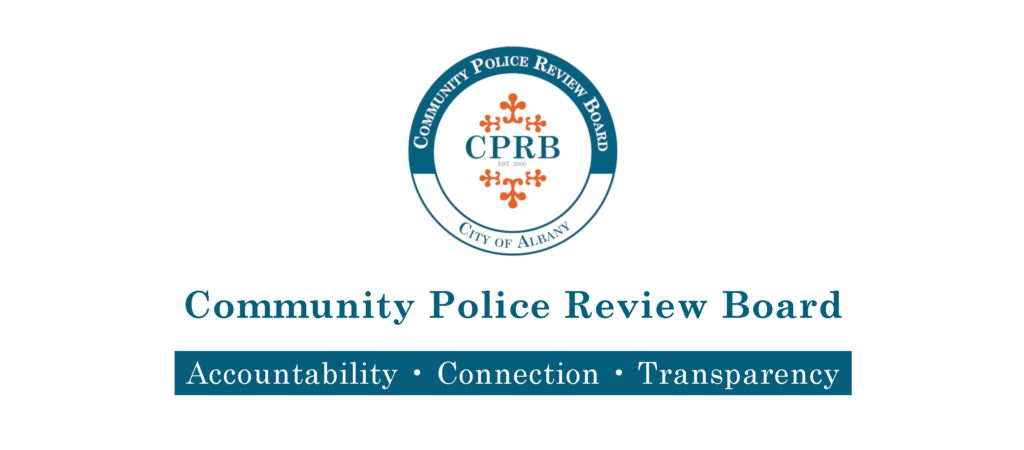What is the Albany Community Police Review Board (CPRB)?
The Albany Community Police Review Board is an independent police oversight agency dedicated to overseeing the conduct of the Albany Police Department (APD), whose mission is to review and investigate alleged misconduct by APD officers. By doing so, they aim to foster stronger bonds between the APD and the public while reinforcing police accountability and trust within the communities served by the APD.
What is the mission and goal of the CPRB?
The CPRB reviews complaints of misconduct committed by officers of the Albany Police Department (APD). The CPRB’s goals are to improve communication between APD and the community and increase police accountability and credibility with the community it serves.
The CPRB aims to improve communication between the Albany Police Department and community members. The CPRB also works to increase police accountability and credibility with the communities that APD serves. The CPRB accomplishes these goals through independent and impartial investigations, policy recommendations, and community outreach.
History
1980s – Community Police Relations Board
Activists in this city had been fighting for decades for an oversight board with teeth that is truly independent with real authority and access to information, with the 1986 Community Police Relations Board being the first iteration of a civilian review board in Albany. The modern version of the Board was created to address the limitations of the previous Board and the growing concerns of the community regarding rising tensions with police in 1999.
2000 – Citizens’ Police Review Board (later renamed the Community Police Review Board)
In November 2000, the City of Albany established the Community Police Review Board (CPRB/Board) through the addition of Part 33 to Chapter 42 of the City Code. This legislation formed a nine-member independent body comprised of community members from the City of Albany, appointed jointly by the Common Council and the Mayor. Its primary function is to examine citizen complaints against the Albany Police Department members regarding alleged misconduct.
For nearly two decades, the Citizens Police Review Board (later renamed the Community Police Review Board) operated under a restricted review model, lacking the authority to conduct independent investigations or compel the production of witnesses or documents independently of the Common Council through subpoenas. This early iteration of the CPRB was primarily focused on reviewing and monitoring the Albany Police Department’s Office of Professional Standards (OPS) investigations into alleged misconduct.
NYCLU Letter: Let Police Review Board Have More Input (Albany Times Union)
2020 – Community Police Review Board Members’ Participation in the City of Albany Policing Reform and Reinvention Collaborative
The turning point came in 2020, following the tragic murder of George Floyd by a Minneapolis police officer, which triggered a public outcry for reform in the City of Albany.
On June 12, 2020, Governor Andrew Cuomo signed an Executive Order requiring each local government to convene stakeholders for a fact-based dialogue about the public safety needs of their community and adopt a policing reform plan by April 1, 2021, or lose future state funding. In line with the directive from Governor Andrew Cuomo, Mayor Kathy Sheehan formed the City of Albany’s Policing Reform and Reinvention Collaborative on August 13, 2020. The purpose of the collaboration was to create a partnership with the community, police, and stakeholders through shared decision-making, resources, and responsibilities to reform policing. Nairobi Vives, Esq., and Larry Becker, Esq., as members of the CPRB, participated in the Policing Reform and Reinvention Collaborative. The Board actively participated in the Policing Reform and Reinvention Collaborative and the city-wide conversation on police reform and continuously engaged and informed the community. For more information on the Policing Reform and Reinvention Collaborative, click here.
2021 – Proposition 7 (Prop 7), also known as Local Law J
This past year (2020 – 2021) marked an unprecedented period of police reform and oversight advocacy for the CPRB, culminating in the passage of Proposition 7 (Prop 7), also known as Local Law J, significantly clarifying and expanding the Board’s authority. The CPRB also actively advocated for more robust police oversight by communicating with the Common Council. In 2021, Local Law J (Prop 7) was unanimously passed by the Common Council, enhancing the CPRB’s effectiveness and authority through increased independent civilian oversight of the APD. This ballot referendum received the approval of 70% of voters. Enacted in 2022, Local Law J unequivocally affirms the CPRB’s authority to conduct independent investigations with subpoena power. This significant expansion of powers enables the CPRB to independently investigate allegations of misconduct by APD members, irrespective of whether a civilian complaint is filed.
The Local Law J affirms the Board’s authority and allows us to:
- Issue subpoenas along with increasing access to police audio and video recordings and other relevant evidence
- Receive quarterly reports from the Chief of Police on disciplinary investigations and action
- Perform audits assessing the investigation and adjudication of civilian complaints
- Have full access to information about any officer involved in the events that are the subject of a complaint
- Conduct independent investigations with subpoena power
- Establish a disciplinary matrix in conjunction with the Chief
- Review and access APD policies, procedures, patterns, practices, and training and make recommendations to APD for improvement
- Provide language access for limited or non-English-proficient complainants and witnesses at all stages of the investigative and adjudicative process
Before Local Law J: CPRB begins reviewing each case after it receives a “preliminary” report from the Albany Police Department’s Office of Professional Standards (OPS).
After Local Law J: CPRB can conduct independent investigations as it deems warranted, even in the absence of a complaint filed with either OPS or CPRB.
Additionally, the new law offers a solid foundation for comprehensive oversight. For example, Local Law J provides the Board the authority to issue subpoenas to compel testimony and produce evidence. It also sets the foundation for the Board to have the authority to recommend discipline for officers if a complaint of misconduct is sustained.
Commentary: In Albany, pass Proposal 7 to strengthen police oversight
NYCLU Letter: ACLU Backs Police Review Legislation in Albany (Albany Times-Union)
Proposal 7 (also known as Local Law J of 2020) Ballot Results 70.52% Approval

March 1, 2021

October 21, 2021
To date, the CPRB has voted to conduct independent investigations into two incidents and six complaints, encompassing issues such as the use of force, the police department’s handling of investigations, police conduct at protests, and officer-involved shooting incidents.

